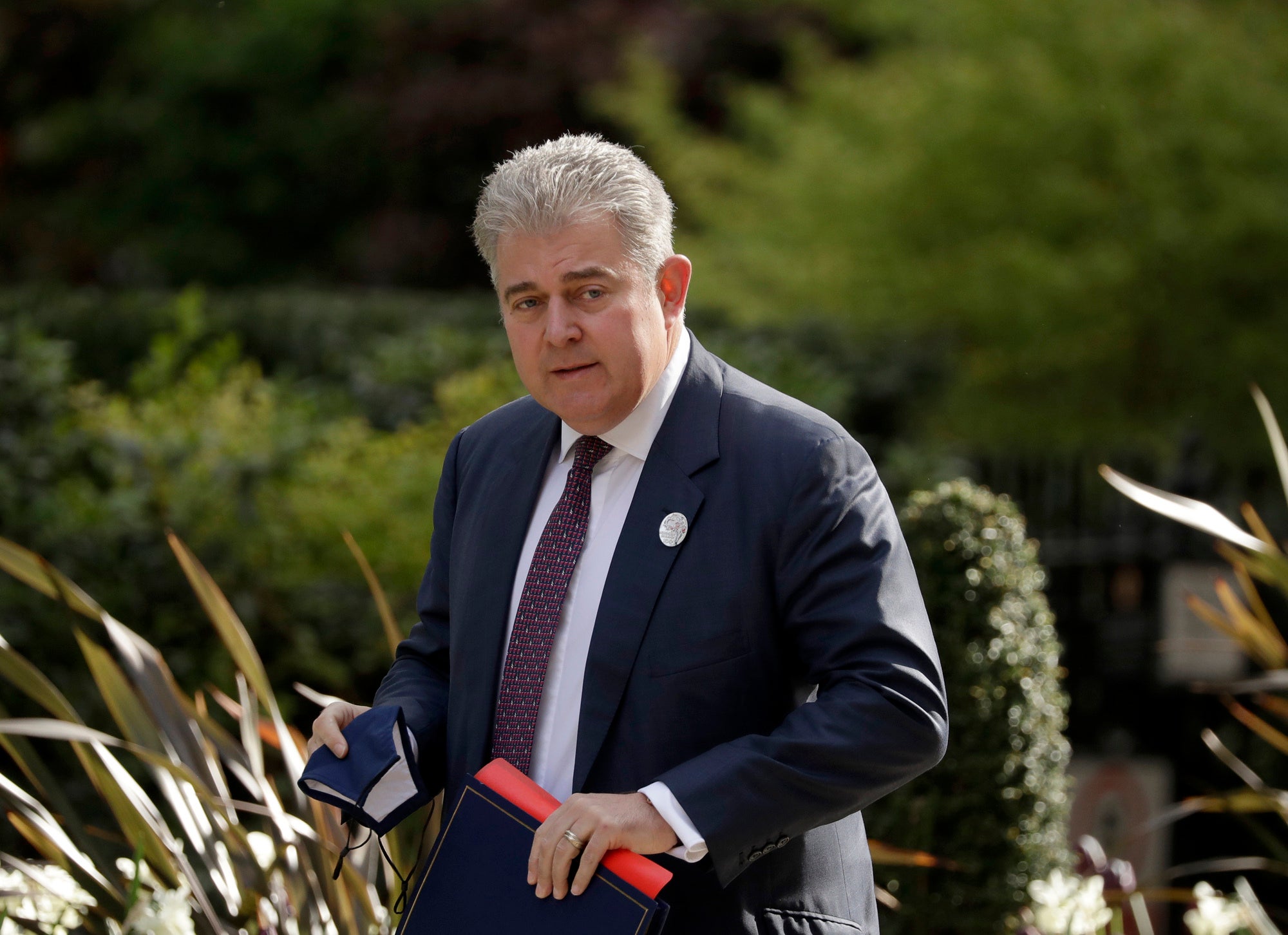Brandon Lewis has a serious problem with integrity – veterans will suffer
Lewis’s latest promise to armed forces veterans of ‘legislation by summer recess’ has had yet another violent collision with reality


Your support helps us to tell the story
From reproductive rights to climate change to Big Tech, The Independent is on the ground when the story is developing. Whether it's investigating the financials of Elon Musk's pro-Trump PAC or producing our latest documentary, 'The A Word', which shines a light on the American women fighting for reproductive rights, we know how important it is to parse out the facts from the messaging.
At such a critical moment in US history, we need reporters on the ground. Your donation allows us to keep sending journalists to speak to both sides of the story.
The Independent is trusted by Americans across the entire political spectrum. And unlike many other quality news outlets, we choose not to lock Americans out of our reporting and analysis with paywalls. We believe quality journalism should be available to everyone, paid for by those who can afford it.
Your support makes all the difference.It was incredibly difficult to watch Brandon Lewis in the House today. I would never let politics come in the way of friendship. I would still go for a beer with him; I think he would be very unlikely to go for one with me.
He has a tough job. He has to deal regularly with the desperately low quality of so-called “community leaders” in Northern Ireland masquerading as serious politicians. Politicians like Colum Eastwood who used parliamentary privilege to name Soldier F in the House of Commons this week, in breach of multiple court orders. I’ve never defended Soldier F, but I will defend his right to a fair process.
Eastwood generally likes to spend his time in the House of Commons creating performances for his social media, with no regard at all to those waking up every day to the painful legacy of the Troubles on either side of the divide. Legacy is tough enough; imagine trying to work through it with characters like Eastwood.
But that is where my sympathy for my friend Brandon Lewis ends, I’m afraid. His latest promise to armed forces veterans of “legislation by summer recess” had yet another violent collision with reality. It isn’t happening (again). He’s launching another consultation.
For veterans, this means any law protecting veterans won’t now materialise until next year at the earliest. Dennis Hutchings will go on trial in October. What a macabre spectacle that will be – if he lives that long. He is 80 and suffering from a terminal disease.
In the House today Lewis again maintained it was his original intention to bring “legislation before summer recess” – right up until the Anglo-Irish summit he attended on 24 June when something changed. Why then did he go on national radio three days later and claim that it was still his intention to bring legislation before the House before summer recess when he knew he had no prospect of doing so?
This was a public slip up that belies my personal experiences with Lewis. Seven times he promised me, over two years, that legislation was being worked on and forthcoming. It never happened. I had misled veterans at his insistence from the despatch box over many months. I resigned to go and support the veterans in court in Belfast. Four of the six veterans’ cases currently before the courts have now collapsed under this public scrutiny.
There is a way forward, but it is not these proposals. Imagine my surprise when, after Lewis telling me the reason he kept missing his self-imposed deadlines was because it was so complex and he was engaging so many different groups, in my 16 different meetings with groups with an interest in legacy when I was in Belfast – victims, veterans and politicians – not one could speak of any meaningful engagement with Lewis on any legacy proposal whatsoever.
Their biggest fear was not resolving legacy – all were agreed the scenes at the courthouse in Belfast in April were a disaster for everyone and they wanted legacy resolved; instead their fear was the Northern Ireland secretary and what he might propose.
So to see these months of “intensive engagement”, as he puts it, result in today’s announcement of an unqualified statute of limitations – an amnesty by another name – is frankly baffling. Baffling because it belies a lack of work; baffling because it belies a serious lack of engagement with families, victims, veterans or indeed anyone, and baffling that he genuinely believes his simplistic approach will have any chance of bringing the people affected by the Troubles with him.
Because there are options available other than this. To state otherwise is I’m afraid, again, untrue. Take Operation Kenova and Chief Constable Jon Boucher’s investigation into one of the hardest cases to investigate – the so-called Agent Stakeknife. He has somehow reached that sweet spot of bringing both families and security operatives with him, while bringing finality to cases.
“But Operation Kenova hasn’t prosecuted anyone, and costs too much money,” cried Lewis in the House, wildly missing the point that this isn’t about prosecutions which are now almost impossible and, in most cases, not the primary desire of loved ones who just want to find out what happened to their relatives.
The prospect of prosecution must not be removed in this way by the government under their proposals. Listen to some of the victim’s voices that were represented today. Their loved ones mattered; they want to know that they mattered, and removing entirely the prospect of prosecution does them a disservice.
Legacy is difficult. You can’t just chuck an amnesty at it. It’s about understanding things like prosecutor codes which should be amended in Northern Ireland for the unique sensitivities and evidential complexities to be considered in Northern Ireland, in a manner they are currently not.
Evidential thresholds could be raised, requiring both verbal and scientific evidence corroborating a person’s guilt. Undercover agent evidence is already challenged in unique ways given the nature of it in so-called “agent provocateur” legal arguments, and if ruled admissible in court almost always leads to a guilty plea. There is flexibility to be made at the public interest gateway, perhaps the criminal history of the suspect since the Troubles offence, the number of crimes and contrition could also be factors in assisting prosecutors decision making in the ways modern prosecutorial codes in Northern Ireland do not currently allow.
My point is there are plenty of options. Everyone wants to see an end to protracted and vexatious investigations and prosecutions in Northern Ireland, but you can’t just wish it away. It requires a depth of thought and analysis that the current actors in this space simply cannot summon.
There is nothing to stop Brandon Lewis throwing financial resources at Operation Kenova and delivering our promise of ending vexatious pursuit of our veterans by the next general election. He should do that, and stop promising things he can’t deliver, and hasn’t done the work for.
Johnny Mercer is the Conservative MP for Plymouth Moor View and former minister for defence people and veterans
Join our commenting forum
Join thought-provoking conversations, follow other Independent readers and see their replies
Comments